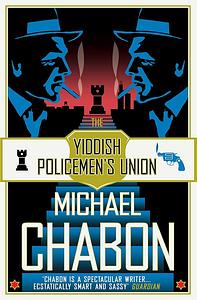Take a photo of a barcode or cover
dark
mysterious
reflective
sad
tense
medium-paced
Plot or Character Driven:
A mix
Strong character development:
Yes
Loveable characters:
Yes
Diverse cast of characters:
Complicated
Flaws of characters a main focus:
Yes
A delightful noir novel. Though the punch of the powerful prose loosens noticeably in the second half, the craftmanship of the first was an absolute joy to read. Chabon's array of characters are diverse and lively—the most prominent of which is undoubtedly the protagonist, who is immediately evocative of a particularly down-on-his-luck, yet peculiarly endearing, Detective Columbo. The alternate world staked out is left broadly ambiguous, but with just enough definite points of contrast with our own to spark a curiosity for more. The plot, again, frays somewhat as it progresses, but holds together largely on the development of its characters more than the various twists and turns of the murder mystery.
emotional
funny
mysterious
medium-paced
Plot or Character Driven:
A mix
Strong character development:
Complicated
Loveable characters:
Yes
Diverse cast of characters:
Yes
Flaws of characters a main focus:
Yes
Autorka dwugwiazdkowej recenzji na Goodreads napisała: "To książka o szachach, śledztwach, judaizmie i Alasce, czyli o rzeczach, na których się nie znam i które mnie nie interesują". W alternatywnej historii Chabona Żydom nie udaje się założyć w 1948 r. państwa Izrael, w związku z czym osiadają m.in. na Alasce. Jest zimno, Indianie nieprzyjaźni, Amerykanie chcą swój stan z powrotem. Fabuła kręci się wokół znalezionego przez policję w hotelu Zamenhof szachisty z kulą w głowie. Czyli faktycznie jest o szachach, śledztwach, Żydach i Alasce - i szczerze mówiąc, przez pierwsze kilkanaście stron drapałem się po głowie, dlaczego to coś zdobyło Hugo, Nebulę i Locusa -nagrodowe trio science fiction. Wtem nagle coś klikło, coś zażarło i zanurzyłem się po pachy w świecie wziętym żywcem z filmów braci Coen, którzy notabene mieli nawet ekranizować tę książkę, ale od 2008 r. ciągle im coś wypada. Wielka szkoda, bo obsadziłem już wszystkie postaci aktorami z "Big Lebowskiego", z oczywistym Johnem Goodmanem jako demonicznym, chorobliwie otyłym rabinem ("it's a glandular problem").
Wydaje mi się, że dla jurorów tych wszystkich nagród fantastyczno-naukowych użycie przez Chabona alternatywnego świata stało się pretekstem, żeby jako literaturę sf zakwalifikować powieść, która fantastyką nie jest, za to jest tak krwista, zabawna i wciągająca, że jurorzy po prostu nie mogli wytrzymać, chichocząc przy tych wszystkich barwnych opisach, jak ten o amerykańskich agentach federalnych, żujących gumę olbrzymach w kolorze płynnego różu, z dobrymi manierami, uśmiechami rodem ze szkółki biblijnej i fryzurami umiejscowionymi gdzieś pomiędzy astronautą a harcmistrzem-pedofilem. Nie wiem, jak było. Ja w każdym razie zamierzam teraz przeczytać wszystko Chabona.
Wydaje mi się, że dla jurorów tych wszystkich nagród fantastyczno-naukowych użycie przez Chabona alternatywnego świata stało się pretekstem, żeby jako literaturę sf zakwalifikować powieść, która fantastyką nie jest, za to jest tak krwista, zabawna i wciągająca, że jurorzy po prostu nie mogli wytrzymać, chichocząc przy tych wszystkich barwnych opisach, jak ten o amerykańskich agentach federalnych, żujących gumę olbrzymach w kolorze płynnego różu, z dobrymi manierami, uśmiechami rodem ze szkółki biblijnej i fryzurami umiejscowionymi gdzieś pomiędzy astronautą a harcmistrzem-pedofilem. Nie wiem, jak było. Ja w każdym razie zamierzam teraz przeczytać wszystko Chabona.
This is a messy book, and one that requires “negative capability” if you are not familiar with Judaism and Jewish culture. On the other hand, it is a beat-for-beat pastiche of classic detective stories, which makes it easy and enjoyable to follow.
The formula: This is the detective story about the alcoholic, divorced police detective living in a terrible hotel, who investigates a murder which ends up “being personal” and “connected to everything” in interesting ways. You know that story, of course--you’ve seen it done straight, ironically, satirically, etc. There are no new "plot points" in this version... but this book tells that story really, really well. There’s also a note of wholesome forgiveness which pervades the narrative— the book isn’t nihilistic or mean. Even while dealing with each other’s pain, the main characters love each other and redeem each other repeatedly, which is a nice touch.
It’s wonderful to encounter a well-known story written by someone who can write really, really well. Michael Chabon is good. He's not sanded or buffed, ornate or precise--he's good because he tries ambitious things and they sort of work. Sometimes the prose wanders down weird alleys, just like the main character, but it achieves well-earned moments.
So—the "big idea" of the book is to place this detective story in a very weird Jewish universe—where the “godfather” character is a rabbi, where almost every male character in the book, from the junkies to the flunkies, wears a yarmulke. Where messiahs might be an actual thing. Where the “it’s bigger than we thought” escalation of the investigation ties into Jewish mysticism and international Jewish politics, etc. etc. And it works. Detractors could say “Why bother? The story doesn't need the matzoh," but I think it reinforces Chabon's theme that humans are humans and stories are stories, wherever they are.
Advice to the reader—keep track of things. Don’t skim over the odd characters met along the way, the historical context (the book is actually alt-history sci-fi), the momentary poetic pauses… the author is trying to do that thing where everything, every encounter and character, all matters in the end.
The Yiddish Policemen's Union is a formula, delivered with a enough twists that they sort of obviously announce themselves as "isn't this an interesting take on this formula?!", but it was all written well enough to win me over. Recommended.
The formula: This is the detective story about the alcoholic, divorced police detective living in a terrible hotel, who investigates a murder which ends up “being personal” and “connected to everything” in interesting ways. You know that story, of course--you’ve seen it done straight, ironically, satirically, etc. There are no new "plot points" in this version... but this book tells that story really, really well. There’s also a note of wholesome forgiveness which pervades the narrative— the book isn’t nihilistic or mean. Even while dealing with each other’s pain, the main characters love each other and redeem each other repeatedly, which is a nice touch.
It’s wonderful to encounter a well-known story written by someone who can write really, really well. Michael Chabon is good. He's not sanded or buffed, ornate or precise--he's good because he tries ambitious things and they sort of work. Sometimes the prose wanders down weird alleys, just like the main character, but it achieves well-earned moments.
So—the "big idea" of the book is to place this detective story in a very weird Jewish universe—where the “godfather” character is a rabbi, where almost every male character in the book, from the junkies to the flunkies, wears a yarmulke. Where messiahs might be an actual thing. Where the “it’s bigger than we thought” escalation of the investigation ties into Jewish mysticism and international Jewish politics, etc. etc. And it works. Detractors could say “Why bother? The story doesn't need the matzoh," but I think it reinforces Chabon's theme that humans are humans and stories are stories, wherever they are.
Advice to the reader—keep track of things. Don’t skim over the odd characters met along the way, the historical context (the book is actually alt-history sci-fi), the momentary poetic pauses… the author is trying to do that thing where everything, every encounter and character, all matters in the end.
The Yiddish Policemen's Union is a formula, delivered with a enough twists that they sort of obviously announce themselves as "isn't this an interesting take on this formula?!", but it was all written well enough to win me over. Recommended.
I think I enjoyed this book. I am not presently thinking clearly enough to say why, or how, but I would say that this is a good book. The characters were lovely, believable people, and I enjoyed my time with them.
dark
funny
medium-paced
Plot or Character Driven:
Character
Strong character development:
Yes
Loveable characters:
Yes
Diverse cast of characters:
N/A
Flaws of characters a main focus:
Yes
A patchy tapestry of clever writing, convoluted plot, interesting characters, and a setting sufficiently odd to be the necessary introduction. Although occasionally frustrating, the frayed edges manage to suggest a system in the threads left they leave exposed, and the central intersections are pretty transcendent anyway.
dark
funny
slow-paced
Strong character development:
Yes





